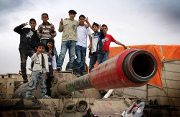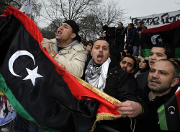By Ashfaq Fateh
Special to ASSIST News Service
SAHIWAL, PAKISTAN (ANS) -- In a bid to end persecution and discrimination and also to promote Christian-Muslim dialogue, a new organization called Peace & Reconciliation Ministries Pakistan (PRMP) has been established (
http://www.wix.com/prmpak/ministries).
 |
Christians protesters with their important message |
To find out more, ANS-Pakistan interviewed Mr. Stephen John, Executive Director PRMP, to find out more and discover what he hopes to achieve through it.
Mr. John told, ANS, "It has been observed that violence against Christians is increasing day by day. They are often accused of blasphemy and killed before they can prove their innocence in the courts.
"Forced conversions and marriages are taking place and also the five percent quota for religious minorities in jobs and civil services is not implemented in many of the provinces of Pakistan."
Mr. John said that the murder of Shahbaz Bhatti, the only Christian cabinet murder, earlier this year, showed the situation in the country was continued to get worse for minorities and Christians in particular.
He revealed that Christian human rights workers, social workers and those involved in women's developments, have recently met in the Punjab city of Sahiwal, Pakistan, to discuss the present situation and how to respond to it.
"These Christian leaders from various cities shared their stories and issues faced by Christians in their areas and how these affect them," John told ANS-Pakistan.
 |
Mr. Stephen John |
He went to say, "The leaders reached a conclusion that there are a small numbers of outlaws in Pakistan who try to destabilize peace here. Unfortunately, although they are small, these forces are strong and they can easily trap and misuse the common Muslim who is peaceful, tolerant and open in normal situation. Unfortunately, over the past three decades these forces have not been curbed by our state departments and they have gained more and more power and strengthened their network.
He went on to say that the leaders discussed examples of normally peaceful cities like Faisalabad and Gojra where violence broke out. "It showed how in these cities, a few outlaws could create law and order situations and took of lives of poor Christians in Gojra violence in 2009 and also the Emmanuel Brothers in 2010, who were gunned down as they left a court in Faisalabad," he said.
Mr. John said that the survival and livelihood of Christians is "linked" with their Muslim brothers and sisters, as well, in many cases, their livelihood as they work for them and in many cases the Muslims trust their Christian workers.
He told ANS, he heard an interview with well-known lawmaker Senator S.M. Zafar on Geo TV when he said that he always trusts and prefers Christian people to work with for "their honesty, hard work and sincerity to their employer."
ANS asked Mr. Stephen John about the objectives of PRMP, he replied, "PRMP has been formed to create an enabling environment for Christians to grow peacefully having reconciliation with Muslims. PRMP will organize programs to foster Christian-Muslim cooperation and will spread a message of peace and reconciliation.
"The basic idea is to make Christians understand that isolation will not help. Interaction between Christians and Muslims will give an opportunity to promote peace and reconciliation."
Mr. Stephen told ANS, "PRMP saw not only Christians face forms of violence, persecution and poverty but millions of Muslims also become prey. For instance, poor Muslim workers are not fairly paid, health care, education and other social services are also out of the reach of Muslims like Christians in Pakistan.
Mr. Stephen revealed that PRMP has decided to set up subsidized Ramadan Bazaars for poor Muslim brothers and sisters. Asked why these bazaars from Christians and how would it work? He replied, "In the western world during Christmas season, food clothing and variety of services are provided on discounted rates.
However, on the contrary, in Pakistan, the black marketers, traders and shopkeepers sell basic necessities of life on more than double rates. Unfortunately, the government fails to stop these practices resultantly poor Muslims suffer. It has been reported that, due to these price hike's, there have been poor people commit suicide.
"PRMP has planned to set up these subsidized bazaars where 1,000 Muslim families would be provided with sugar, rice, tea, cooking oil, lentils, onions, potato, pepper, spices, bath soaps and washing powder on subsidized rates rather than open and government-based utility and model bazaars," he said. "However, we will not give a subsidy on wheat flour as the government of the Punjab is already doing that.
"When the Muslim families purchase these items from their Christian brothers and sisters, it will create good impact at least many thousand people directly. It will also help to change the mindset of Muslims when they realize that Christians love them and respect their faith. We are hoping that our national and also international media as well as opinion-makers, will positively welcome this gesture of goodwill."
Mr. Stephen then told ANS, "This ministry has launched an appeal to the international Christian community, including churches, and ministries, that they would donate funds for this noble cause which strengthen friendship and acceptance of the Christian community in Pakistani society."
Peace & Reconciliation Ministries Pakistan's headquarters is in Sahiwal and can be reached at
prmpak@gmail.com
| Ashfaq Fateh, 38, studied civic and human rights, at Pakistan's leading University, the Aga Khan University in Karachi. He has been working to promote peace, human rights and particularly for Christian's rights. He has also been working against the discriminatory laws prevailing in Pakistan. His wife, Rafia Salomi, is serving as deputy director for Society for Human Development, popularly known as Human Development Center, an icon of Christian's rights in Pakistan since 1984. |  |






